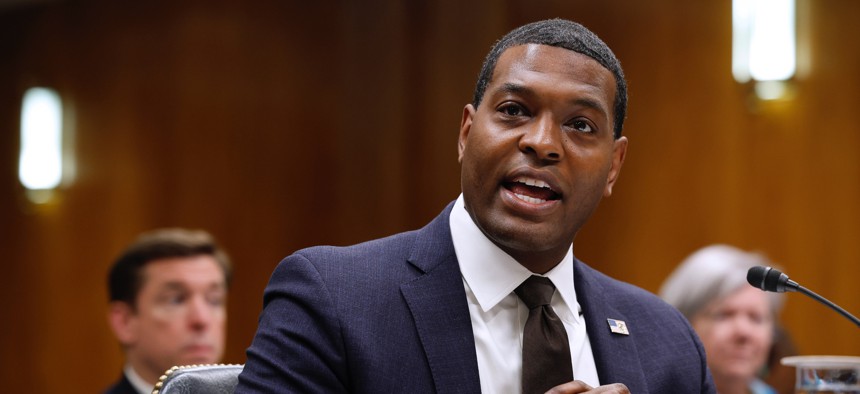
Environmental Protection Agency Administrator Michael Regan said a new memorandum of understanding would allow the American Climate Corps to "work across the federal family." Chip Somodevilla / Getty Images
Seven agencies join forces in hopes of quickly implementing Biden's Climate Corps initiative
Many details of the program still must be sorted, though the Biden administration is promising 20,000 participants will be enrolled by the summer and receive a suite of benefits.
Seven federal agencies are partnering to implement President Biden’s American Climate Corps, announcing this week they would work together to recruit 20,000 young Americans and fulfill the administration's vision for the new program.
The goals spelled out in the memorandum of understanding include comprehensively tackling climate change, creating partnerships throughout various levels of government and the private sector, building a diverse corps and serving all American communities.
The agencies—which included the departments of Commerce, Interior, Agriculture, Labor and Energy, as well the Environmental Protection Agency and AmeriCorps—also vowed to ensure a “range of compensation and benefits” that open the positions up to a wider array of individuals and to create pathways to “high-quality employment.”
Leaders from each of the seven agencies will form an executive committee for the Climate Corps, which Biden established in September, that will coordinate efforts with an accompanying working group. They will create the standards for ACC programs, set compensation guidelines and minimum terms of service, develop recruitment strategies, launch a centralized website and establish performance goals and objectives. The ACC groups will, beginning in January, hold listening sessions with potential applicants, labor unions, state and local governments, educational institutions and other stakeholders.
The working group will also review all federal statutes and hiring authorities to remove any barriers to onboarding for the corps and standardize the practices across all participating agencies. Benefits for corps members will include housing, transportation, health care, child care, educational credit, scholarships and student loan forgiveness, stipends and non-financial services.
As part of the goal of the ACC, agencies will develop the corps so they can transition to “high-quality, family-sustaining careers with mobility potential” in the federal or other sectors. AmeriCorps CEO Michael Smith said the initiative would prepare young people for “good-paying union jobs.”
Within three weeks of rolling out the ACC, EPA said more than 40,000 people—mostly in the 18-35 age range—expressed interest in joining the corps. The administration set an ambitious goal for getting the program underway, aiming to establish the corps’ first cohort in the summer of 2024.
The corps members will work in roles related to ecosystem restoration and conservation, reforestation, waterway protection, recycling, energy conservation, clean energy deployment, disaster preparedness and recovery, fire resilience, resilient recreation infrastructure, research and outreach. The administration will look to ensure 40% of the climate-related investments flow to disadvantaged communities as part of its Justice40 initiative.
EPA Administrator Michael Regan said the MOU would allow the ACC to “work across the federal family” to push public projects focused on environmental justice and clean energy.
“The Climate Corps represents a significant step forward in engaging and nurturing young leaders who are passionate about climate action, furthering our journey towards a sustainable and equitable future,” Regan said.
The MOU does not itself authorize any funding for the initiative, saying only the financial arrangements will be spelled out in future agreements. Congressional Republicans have pushed back on the ACC’s creation and solicited more specifics on its funding.
In October, the GOP-controlled House Oversight and Accountability Committee sent a letter to AmeriCorps CEO Michael Smith, inquiring about the ACC’s sources of funding and expenditures of the program. The panel asserted the White House established it without congressional authorization or clear guidance for how it would pay for it.
In a contentious 217-216 vote in September, House Republicans approved an amendment to a funding bill that would block any federal funding for the ACC. That provision has not yet received consideration in the Senate, where it is unlikely to receive approval from the Democratic majority. Last month, Rep. Bob Good, R-Va., introduced the No American Climate Corps Act to eliminate the program.
The ACC’s executive committee will hold its first meeting within the next 30 days. It will draw support from a new climate hub within AmeriCorps, as well as any staffing the agency heads designate.







